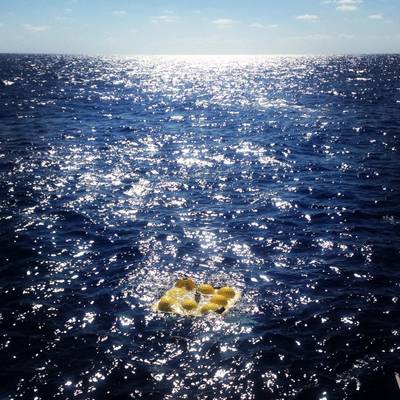$140m Awarded for GoM Oil Impact Research

ECOGIG Recovered Lander. This Seafloor Lander was recovered at Sea in November of 2012. (Photo Credit: Beth Orcutt, ECOGIG Consortium, University of Mississippi)
12 consortia to study oil impacts on Gulf of Mexico
The Gulf of Mexico Research Initiative (GoMRI) has selected 12 research consortia to conduct scientific studies of the impacts of oil, dispersed oil, and dispersant on the Gulf of Mexico ecosystem and public health. These research investments focus on improving our fundamental understanding of the implications of events such as the Macondo well blowout, and on developing improved spill mitigation, oil and gas detection, characterization and remediation technologies. The consortia were chosen following a competitive, merit review process that evaluated research applications submitted to GoMRI in response to its RFP-IV program solicitation.
Through the RFP-IV program, GoMRI is awarding $140 million to support research to be carried out from 2015 through 2017.
For the past several years, GoMRI has reached out to the public health research community. "It was clear that research on public health is needed," said Dr. Rita Colwell, Chairman of the GoMRI Research Board. "I'm pleased that in this round of awards there are funds to study public health issues in the Gulf of Mexico region associated with the oil spill. We are also funding research focused on increasing our knowledge of the biology of the Gulf and the interaction of oil with the ecosystem."
This is the second round of funding provided by GoMRI to consortia – research groups consisting of a lead investigator and collaborators from four or more other institutions.
"A significant benefit of our prior support is increased collaboration among scientists and institutions across the Gulf. This round of funding will continue to build a research community focused on understanding the dynamics of the Gulf of Mexico ecosystem," said Colwell.
Forty-seven research proposals were received. Each proposal described how the consortium would operate and the kind of research it would conduct to increase scientific understanding of one or more of five research themes, which are:
- Physical distribution, dispersion, and dilution of petroleum (oil and gas), its constituents, and associated contaminants (e.g., dispersants) under the action of physical oceanographic processes, air–sea interactions, and tropical storms.
- Chemical evolution and biological degradation of petroleum/dispersant systems and subsequent interaction with coastal, open-ocean, and deep-water ecosystems.
- Environmental effects of the petroleum/dispersant system on the sea floor, water column, coastal waters, beach sediments, wetlands, marshes, and organisms; and the science of ecosystem recovery.
- Technology developments for improved response, mitigation, detection, characterization, and remediation associated with oil spills and gas releases.
- Impact of oil spills on public health, including behavioral, socioeconomic, environmental risk assessment, community capacity and other population health considerations and issues.
Research consortia selected for funding are:
- Nova Southeastern University, "Deep-Pelagic Nekton Dynamics of the Gulf of Mexico," Lead Investigator Tracey Sutton
- University of Miami - Rosenstiel School of Marine and Atmospheric Science, "Relationship of Effects of Cardiac Outcomes in Fish for Validation of Ecological Risk," Lead Investigator Martin Grosell
- University of Texas at Austin, "Dispersion Research on Oil: Physics and Plankton Studies," Lead Investigator Edward Buskey
- University of Southern Mississippi, "Consortium for Oil Spill Exposure Pathways in Coastal River-Dominated Ecosystems," Lead Investigator William (Monty) Graham
- University of Louisiana at Lafayette, "Littoral Acoustic Demonstration Center," Lead Investigator Natalia Sidorovskaia
- Marine Environmental Sciences Consortium/Dauphin Island Sea Lab, "Alabama Center for Ecological Resilience," Lead Investigator John Valentine
- Texas A&M University, "Role of Microbial Exopolymers in Aggregation and Degradation of Oil and Dispersants," Lead Investigator Antonietta Quigg
- Louisiana Universities Marine Consortium, "Coastal Waters Consortium," Lead Investigator Nancy Rabalais
- University of Miami, "The Consortium for Advanced Research on Transport of Hydrocarbon in the Environment II," Lead Investigator Tamay Özgökmen
- RAND Corporation Gulf States Policy Institute, "Consortium for Resilient Gulf Communities," Lead Investigator Melissa Finucane
- The University of Georgia, "Ecosystem Impacts of Oil and Gas Inputs to the Gulf – 2," Lead Investigator Samantha Joye
- University of South Florida, "The Center for the Integrated Modeling and Analysis of Gulf Ecosystems II," Lead Investigator Steven Murawski
GoMRI is a 10-year research initiative established in 2010 and funded by a $500 million commitment by BP. GoMRI is administered by an independent Research Board, which consists of 20 experts in science, research administration, and public health. The Research Board evaluates research proposals following merit review guidelines of the National Academies of Science and procedures similar to those of the U.S. National Science Foundation. All funding decisions are made by the Research Board, which is independent of BP and not connected to the Natural Resources Damage Assessment process.




